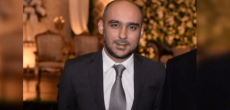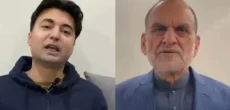[vc_row][vc_column][vc_column_text dp_text_size=”size-4″]In a challenging period for Pakistan’s former Prime Minister Imran Khan, he faces potential imprisonment totaling 14 years on corruption charges alongside his wife, Bushra Bibi. Additionally, there’s a looming 10-year sentence in the case of leaking state secrets. Despite these grave legal predicaments, the imprisoned politician remains steadfast in his dissent, navigating one of the darkest chapters in his political career.
Recently, Imran Khan engaged in an informal conversation with journalists, shedding light on backchannel contacts with influential figures through his wife, Bushra Bibi. However, he emphatically rejected any notion of accepting ‘deals.’ The former cricketer, hailed as one of the top skippers of all time, dispelled the perception that Bushra Bibi was relocated to the Banigala residence as part of a deal involving her serving a sentence.
Read more: Imran Khan Challenges Nomination Paper Rejection In SC
Khan, aged 71, disclosed that individuals from influential quarters approached him indirectly, offering a deal through Bushra Bibi. The proposition involved urging him to adopt a more compliant stance in exchange for leniency in the ongoing legal cases. Khan clarified that this offer materialized before his conviction while he was in Attock prison.
Providing further insights, Khan revealed his unequivocal rejection of the offer, asserting his unwavering commitment to the demand for a democratic system. He underscored the significance of standing firm on this principle even in the face of external pressures.
Recalling his interactions with the former Chief of Army Staff (COAS), General (r) Qamar Javed Bajwa, Khan emphasized his advocacy for free and fair elections. He conveyed a message to the establishment, urging them to consider the welfare of the 25 crore masses in their decisions.
Imran Khan did not shy away from leveling accusations against the former Army Chief, alleging a conspiracy against the PTI government from its inception. Furthermore, he accused General (r) Bajwa of orchestrating the cipher case against him, asserting that it was part of a larger conspiracy against the duly elected regime.
In his assessment, Khan linked the issue of rigged elections with political instability, suggesting that the country’s economy is teetering on life support. He utilized this opportunity to launch a fresh verbal assault against Nawaz Sharif and his party, as well as the Election Commission, accusing them of potential hijacking in the upcoming elections.
Imran Khan’s candid revelations in this informal conversation underscore the complexity and high stakes of Pakistani politics. The interplay between legal challenges, political maneuvering, and allegations of conspiracies provides a glimpse into the tumultuous landscape that shapes the trajectory of the country’s leadership. As Khan confronts the legal battles ahead, his unwavering commitment to democratic principles and vocal dissent against perceived injustices further define his political narrative in this critical juncture.[/vc_column_text][/vc_column][/vc_row]











